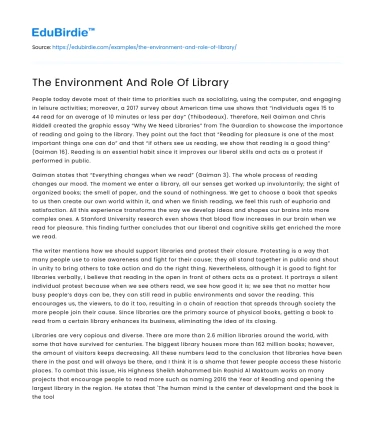People today devote most of their time to priorities such as socializing, using the computer, and engaging in leisure activities; moreover, a 2017 survey about American time use shows that “individuals ages 15 to 44 read for an average of 10 minutes or less per day” (Thibodeaux). Therefore, Neil Gaiman and Chris Riddell created the graphic essay “Why We Need Libraries” from The Guardian to showcase the importance of reading and going to the library. They point out the fact that “Reading for pleasure is one of the most important things one can do” and that “if others see us reading, we show that reading is a good thing” (Gaiman 16). Reading is an essential habit since it improves our liberal skills and acts as a protest if performed in public.
Gaiman states that “Everything changes when we read” (Gaiman 3). The whole process of reading changes our mood. The moment we enter a library, all our senses get worked up involuntarily; the sight of organized books; the smell of paper, and the sound of nothingness. We get to choose a book that speaks to us then create our own world within it, and when we finish reading, we feel this rush of euphoria and satisfaction. All this experience transforms the way we develop ideas and shapes our brains into more complex ones. A Stanford University research even shows that blood flow increases in our brain when we read for pleasure. This finding further concludes that our liberal and cognitive skills get enriched the more we read.
The writer mentions how we should support libraries and protest their closure. Protesting is a way that many people use to raise awareness and fight for their cause; they all stand together in public and shout in unity to bring others to take action and do the right thing. Nevertheless, although it is good to fight for libraries verbally, I believe that reading in the open in front of others acts as a protest. It portrays a silent individual protest because when we see others read, we see how good it is; we see that no matter how busy people’s days can be, they can still read in public environments and savor the reading. This encourages us, the viewers, to do it too, resulting in a chain of reaction that spreads through society the more people join their cause. Since libraries are the primary source of physical books, getting a book to read from a certain library enhances its business, eliminating the idea of its closing.
Libraries are very copious and diverse. There are more than 2.6 million libraries around the world, with some that have survived for centuries. The biggest library houses more than 162 million books; however, the amount of visitors keeps decreasing. All these numbers lead to the conclusion that libraries have been there in the past and will always be there, and I think it is a shame that fewer people access these historic places. To combat this issue, His Highness Sheikh Mohammed bin Rashid Al Maktoum works on many projects that encourage people to read more such as naming 2016 the Year of Reading and opening the largest library in the region. He states that 'The human mind is the center of development and the book is the tool used to renew the mind. A nation can never grow without a renewed mind and a lively, knowledgeable spirit' (Sheikh Mohammad).
All people from different ages and places are welcome to visit libraries, and all of them have one cause: to read and get educated. Libraries have a very welcoming environment as Gaiman says, 'libraries are about freedom' (Gaiman 10); therefore, we should fulfill the libraries' cause by going in and enjoying the books they provide us with. After all, we could have never reached today's knowledge and technology if books were never there, so we cannot just disregard them now; especially when we benefit from the experience too. Whether we read digital or physical books, the most important part is reading. However, no matter how simple technology makes getting information, we should always make an effort from time to time to go to the library and read physical books.






 Stuck on your essay?
Stuck on your essay?

